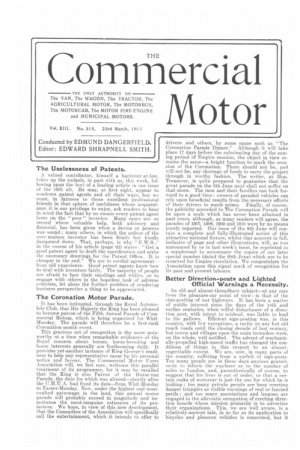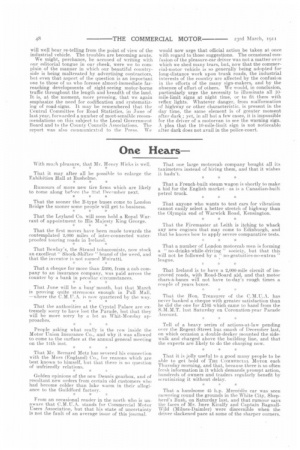The Uselessness of Patents.
Page 1

Page 2

If you've noticed an error in this article please click here to report it so we can fix it.
A valued contributor, himself a barrister -at-law, takes up the cudgels, in part with us, this week, following upon the text of a leading article in our issue of the 16th ult. He may, at first sight, appear to condemn patent agents and all their ways, but we must, in fairness to those excellent professional friends in that sphere of usefulness whose acquaintance it is our privilege to enjoy, ask readers to bear in mind the fact that by no means every patent agent lures on the " poor " inventor. Many cases are on record where valuable help, both advisory and financial, has been given when a device or process was sound ; many others, in which the ardour of the over-zealous inventor has been firmly but kindly dampened down. That., perhaps, is why. "
in the course of his article (page 62) states : "Get a good patent agent to draft the specification and make the necessary drawings for the Patent Office. It is cheaper in the end." We are in cordial agreement• • from old experience. Good patent agents know how to deal with inventors fairly. The majority of people are afraid to face their cajolings and whiles, or to engage with others in the hopeless task of adverse criticism, let alone the further problem of rendering business perspective a thing to be appreciated.
The Coronation Motor Parade.
It has been intimated, through the Royal Automobile Club, that His Majesty the King has been pleased to become patron of the Fifth Annual Parade of Commercial Moto, which is being organized for Whit-Monday. The parade will therefore be a first-rank Coronation-month event.
This gracious act of recognition is the more noteworthy at a time when remarkable evidences of the Royal concern about horses, horse-breeding and horse interests generally are forthcoming daily. It provides yet-another instance of King George's readiness to help any representative cause by his personal notice and favour. The Commercial Motor Users Association will, we feel sure, welcome this parallel treatment of its programme, for it. may be recalled that the King is also Patron of the Horse-van Parade, the date for which was altered—shortly after the C.M.U.A. had fixed its date—from Whit-Monday to Easter-Monday. Now, under the highest and mostexalted patronage in the land, this annual motor parade will probably exceed in magnitude and importance the most-sanguine estimates of its promoters. We hope, in view of this new development, that the Committee of the Association will specifically call the entertainment, which it intends to offer to
drivers and others, by some name such as "The Coronation Parade Dinner." Although it will take place 17 days before the culminating day of the coming period of Empire reunion, the object in view remains the same—a bright function to mark the occasion of the Coronation. There should not be, and will not be, any shortage of funds to carry the project through in worthy fashion. The writer, as Hon. Treasurer, is quite prepared to guarantee that the great parade on the 5th June next shall not suffer on that score. The men and their families can look -forward to a good time: owners of paraded vehicles can rely upon beneficial results from the necessary efforts of their drivers to merit prizes. Finally, of course, the publicity accorded to The Coronation Parade will be upon a scale which has never been attained in past years, although, as many readers will agree, the parades of 1907, 1908, 1909 and 1910 were by no means poorly reported. Our issue of the 8th June will contain a complete and fully-illustrated notice of this attractive national fixture, whilst that account in full, inclusive of page and other illustrations, will, as was announced by us in last week's issue, be reprinted as a supplement to accompany the copies of our later special number (dated the 29th June) which are to be reserved for Empire circulation. We congratulate the Association upon this signal mark of recognition for its past and present labours.
Better Direction-poste and Lighted Official Warnings a Necessity.
An old and almost-threadbare subject—at any rate from the pleasure-car point of view—is that of the sign-posting of our highways. It has been a matter of nubile interest since the days of the 18th and earlier centuries, when wilful disturbance of a direction post, with intent to mislead, was liable to lead to the gallows. Efficient sign-posting was, in this country, with few exceptions, a rarity on any but old coach roads until the closing decade of last century, but towns and villages upon the main turnpikes were, on the whole, well notified, The advent. of mechanically-propelled high-speed traffic has changed the conditions of things in this respect to an almostregrettable extent. We are, now, in many parts of the country, suffering from a surfeit of sign-posts. Too many people are in these days anxious gratuitously to inform the wayfarer as to the number of miles to London, and, parenthetically of course, to suggest that his liver is out of order, or that. a certain make of motorcar is just the one for which he is looking ; too many private people are busy erecting danger triangles as visible warnings of real or fancied perils ; and too many associations and leagues. are engaged in the altruistic occupation of erecting direction hoards whose mission primarily is to advertise their organizations. This, we are well aware, is a relatively-ancient tale, in so far as its application to bicycles and pleasure vehicles is concerned, but it
will well bear re-telling from the point of view of the industrial vehicle. The troubles are becoming acute. We might, perchance, he accused of writing with our editorial tongue in our cheek, were we to complain of the manner in which, our beautiful countryside is being maltreated by advertising contractors, but even that aspect of the question is an important one to those of us who foresee almost-immediate farreaching developments of sight-seeing motor-borne traffic throughout the length and breadth of the land. It is, at the moment, more pressing, that we again emphasize the need for codification and systematizing of road-signs. It may be remembered that the Central Committee for Road Statistics, in .Tune of last year, forwarded a number of most-sensible recommendations on this subject to the Local Government. Board and to the County Councils Associations. The report. was also cominunicateA to the Press. We would now urge that official action be taken at once with regard to those suggestions. The occasional confusion of the pleasure-car driver was not a matter over which we shed many tears, but, now that the commercial-motor vehicle is so generally being adopted for long-distance work upon trunk roads, the industrial interests of the country are affected by the confusion in the efforts of the many sign-makers, and by the absence of effort of others. We would, in conclusion, particularly urge the necessity to illuminate all 10mile-limit signs at night time, or to fit them with reflex lights. Whatever danger, from malformation of highway or other characteristic, is present in the day time, the same element is of greater moment after dark ; yet, in all but a few cases, it is impossible for the driver of a, motorvan to see the warning sign. A plea that the 10-mile-limit sign is not noticeable after dark does not avail in the police-court.






















